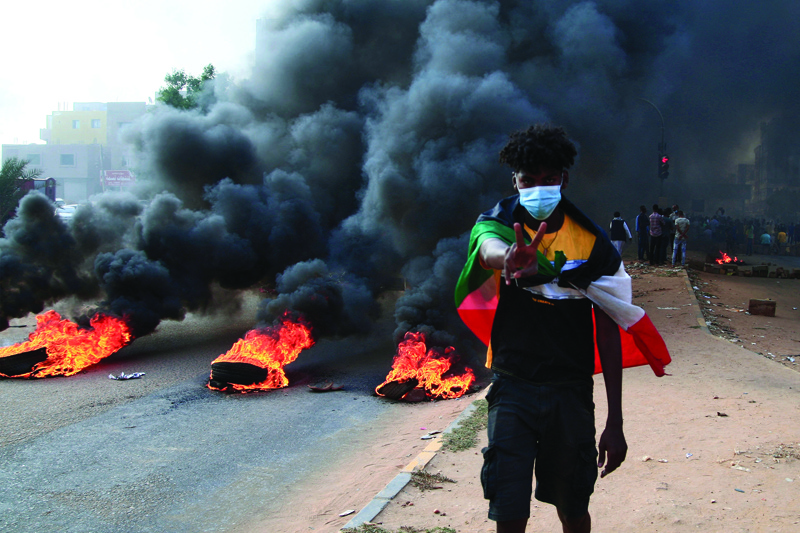 KHARTOUM: A Sudanese protester draped with the national flag flashes the victory sign next to burning tires during a demonstration yesterday. - AFP
KHARTOUM: A Sudanese protester draped with the national flag flashes the victory sign next to burning tires during a demonstration yesterday. - AFPKHARTOUM: Sudan's top general declared a state of emergency and dissolved the authorities leading the country's democratic transition yesterday, after soldiers detained civilian leaders in what the UN condemned as a "coup". General Abdel Fattah Al-Burhan's announcement in a televised address came after armed forces detained government leaders in charge of heading the transition to full civilian rule, following the April 2019 ouster of autocrat Omar Al-Bashir.
"To rectify the revolution's course, we have decided to declare a state of emergency nationwide... dissolve the transitional sovereign council, and dissolve the cabinet," said Burhan, who announced the formation of a new government. His statement came as clashes erupted in the capital Khartoum, with soldiers firing live rounds at people who took to the streets to protest against the military. "Civilian rule is the people's choice," demonstrators chanted. "No to military rule".
Medics said soldiers killed two people and wounded more than 80 others. "Two people were killed in gunfire by forces of the military council coup," said the Central Committee of Sudan Doctors, an independent union of medics. The union said doctors have also counted "more than 80 wounded". The violence, largely centered outside the army headquarters in the capital, came hours after soldiers detained Prime Minister Abdalla Hamdok, ministers in his government and civilian members of Sudan's ruling council, the information ministry said. They were taken away after "refusing to support the coup", it said on Facebook.
UN Secretary-General Antonio Guterres denounced the military takeover and called for leaders to be freed. "I condemn the ongoing military coup in Sudan," Guterres said on Twitter. "Prime Minister Hamdok and all other officials must be released immediately."
Internet services were cut across the country around dawn and the main roads and bridges into Khartoum shut, before soldiers stormed the headquarters of Sudan's state broadcaster in the capital's twin city of Omdurman, the information ministry said. People took to the streets soon after, setting tires ablaze and piling rows of bricks across roads in protest against the military move, an AFP correspondent reported.
"Military forces have fired live bullets on protesters rejecting the military coup outside the army headquarters," the ministry added. Under a 2019 power-sharing deal after the ouster of Bashir, Sudan is ruled by a sovereign council of civilian and military representatives tasked with overseeing a transition to a full civilian government. But in recent weeks the cracks in the leadership had grown wider.
Jonas Horner, from the International Crisis Group think-tank, called it an "existential moment for both sides". "This kind of intervention... really puts autocracy back on the menu," he warned. The power grab by the army was condemned by the international community, with the European Union calling for the "fast release" of the civilian leadership, and the African Union and Arab League also expressing concern.
US Special Envoy for the Horn of Africa Jeffrey Feltman said Washington was "deeply alarmed at reports of a military takeover of the transitional government". Bashir, who ruled Sudan with an iron fist for three decades - and is wanted to face charges of genocide in Darfur by the International Criminal Court - is jailed in Khartoum.
But UN High Commissioner for Human Rights Michelle Bachelet warned Sudan risked stepping backwards towards autocracy. "It would be disastrous if Sudan goes backwards after finally bringing an end to decades of repressive dictatorship," Bachelet said. "The country needs to move forward to consolidate democracy." In recent days, rival protests have been held, with sit-ins outside the presidential palace demanding a return to "military rule", and in response, tens of thousands marching to back the full transfer of power to civilians. The two sides represent opposing factions of the Forces for Freedom and Change (FFC), the civilian umbrella group which spearheaded demonstrations that led to the army's overthrow of Bashir.
Tensions between the two sides have long simmered, but divisions ratcheted up after a failed coup on Sept 21 this year. Yesterday, the mainstream FFC appealed for nationwide "civil disobedience", calls also made by Sudan's bankers' association and doctors' union. The Sudanese Professionals Association, an umbrella group of trade unions which were key in leading the 2019 anti-Bashir protests, denounced what it called a "military coup" and urged demonstrators "to fiercely resist" it.
Protesters were seen marching through the streets of Khartoum carrying the Sudanese flag. "We will not accept military rule and we are ready to give our lives for the democratic transition in Sudan," said demonstrator Haitham Mohamed. "We will not leave the streets until the civilian government is back," Sawsan Bashir, another protester, told AFP.
The developments come two days after a Sudanese faction calling for a transfer of power to civilian rule warned of a "creeping coup", at a news conference that was attacked by an unidentified mob. "The crisis at hand is engineered - and is in the shape of a creeping coup," mainstream FFC leader Yasser Arman told Saturday's news conference in Khartoum. Hamdok has previously described splits in the transitional government as the "worst and most dangerous crisis" facing the transition. - AFP










